(We welcome the return of guest writer Alain Mower and the third in his series of interviews of women in metal. In this edition, he talks with two members of Portland-based Eight Bells – Melynda Jackson and Haley Westeiner — whose 2013 album The Captain’s Daughter turned a lot of heads.)
This series is dedicated to creating discussion and awareness by expressing the observations, thoughts, and opinions of current prolific metal musicians who, in their spare time, also happen to be women. This began as a direct response to the few stragglers in the community who think that there is still a place for misogyny in metal.
If this results in you punching some loud-mouth, drunk sexist at the next show you go to or calling someone out when they question the attendance, attire, or musical capabilities of a woman at a show, then that’s all I could ever ask, and then some.
What first attracted you to metal music / the metal scene?
Melynda: I love how metal is loud and aggressive and that there is a certain technical element to the genre. I enjoy the intense emotion of metal and the darkness. In the 80s, when I was a kid, as well as the 90s of my youth, my friends and I liked metal as well as new wave, deathrock, noise, etc. — there was no rule that you had to only like one type of music. As far as a music scenes goes, I have found more support overall for my projects in the metal scene and from metal fans over the 16 or so years I have been playing in bands. At least on the west coast, I find that metalheads are fun people with way varied tastes in music, and I appreciate that – though I am lucky that I don’t run into to many purists. We have nothing in common and so we don’t gravitate to one another. I have found more issues with people being closed to multiple genres in scenes outside of Heavy Metal.
Haley: The darkness, intensity, clarity of vision, and execution of grandiose musical ideas. Great metal players are like classical musicians to me, in terms of passion and virtuosity, but they are often musicians who were discouraged from pursuing music through a conventional route. This rang true to me, as I was having a hard time being successful in school and in the respected social scene of my town, beginning in adolescence. Emotionally, it was a mixture of depression, anger, and fire-in-the-belly exuberance that paved the way. I grew up in West Hartford, Connecticut, and was fortunate to be exposed to many kinds of heavy and strange music early on, by family and friends, and there were some great independent records stores in the area. I was always super-attracted to metal dudes. Their long, flowing hair, irreverent fuck-you attitude, tight leather and denim, killer chops, and passionate musical O faces always intrigued me. I thought the preppy dudes in my town were total choads.
What inspired/lead you, as a musician, to delve into the relatively small (albeit dedicated) niche market of dark music?
Melynda: It just resonates with me. I used to be a bit of a death rocker in my youth and have always been attracted to sounds and feelings that are less socially acceptable — especially aggression, noise, and volume. Minor chords and passionate suffering I suppose. Also power in volume. Of course there is also the rebellious side of it – parents hate this music. You kinda know where you stand when you are in league with others who appreciate and even celebrate dark tendencies, ideas, feelings, and aesthetics. It feels like home.
Haley: I think if you have the darkness, or whatever you want to call it, in you, that’s what will come out, and it is healthy to let it out and become something beautiful. We are the sound the Earth is making. When I first got really into the bass and songwriting, at about age 16, it was very dark and obsessive and reflected issues I was having at the time. Heavy, aggressive music has always provided me with a physical/mental/emotional catharsis that is so therapeutic. Endorphins from playing live are addictive to me and the connections you make with people make the world feel good. The sweating, swaying, head banging, almost losing control but not… I need the substance and sonic depth of metal in order to get where I need to be on every level.
As a female musician in the metal scene, have there been any hurdles that you have had to overcome?
Melynda: I think the biggest hurdle for me is to always remember to keep my eye on what I want and what I am doing, rather than what they want and what they are doing. MAKE THE MUSIC. I can get really caught up in the bullshit and get really paralyzed. If I put it in perspective, I get WAY more support than shunning/undermining. Those things, the sexist comments, assumptions and expectations, when they do happen are too subtle almost to explain, and mostly I don’t have time to explain it anyway because I want to make art. I do think that most guys are trying to understand it, and we are somewhat trapped by an outdated culture…
The world does change, but slowly, and I comfort myself with the knowledge that I am exactly where I am supposed to be. I want to gravitate toward the change that is happening right now and I see a difference even during the period of time that I have been playing on the music scene. I have had a guy feel my fingertips then tell me I wasn’t a real guitar player, had people assume I was doing merch, had them assume that they should settle at the end of the night with the dudes in the band, etc. Most of these things have happened off the west coast though. I use the hurt and make something else of it – everything that happens, good or bad, only inspires and fuels me onward. Rage, sadness, joy, all of it.
This is not to say that I don’t get lost in it sometimes (the frustration over bigotry), or feel it, or notice it, but I certainly don’t want to waste my time defining it for others to tell me it doesn’t exist. I redirect myself to my goal, and that is to be productive. In doing that, I am accomplishing exactly the answer to the problem as it exists.
It is important to remember that there are hurdles everywhere. I mean back when I was in a riot girl band I was told I was too metal because I played power chords rather than one finger stuff – a scene that I found at the time was even more exclusive in terms of WHICH women were allowed – now I am not metal enough. But I think I fit just fine with misfits, so although I can’t really jump hurdles, I can walk around them.
Haley: As an adolescent and young adult, I had to leave the dominant metal and other male-dominated music scenes for several years and go into an alternative to the alternative music subculture, mostly comprised of queer feminist punk and metal musicians and artists. It’s part of my development and own personal mindfuck that much of the stuff I’ve loved the most over the years feels on some level masochistic for me, making me “love” my own degradation. I mean, Guns ‘N’ Roses was my favorite band when I was 12! I never stopped loving any of that music, but to actually thrive and not be conditioned as a regular “woman” according to the culture these bands were perpetuating, even subtly, I needed to be in a space for a period of years where people wouldn’t, for example, hurl around the word pussy as an insult; or just automatically expect me to suck as a musician and then, so surprised after I play, tell me I’m the “best girl bass player” they’ve met. Again. My personality needed space from that so I could develop my brain and my skills in an environment that felt less weird to me. I feel like because I chose myself – like, I stopped watching TV, played bass and 4-tracked for hours a day, and became more discerning about who I’d spend my free time with – that it gave me this layer of resilience and tolerance that I now take with me.
Another challenge is figuring out how to talk about being a woman in metal, doing the dance between being proud of one’s self as a woman, acknowledging that women are under-represented, and not letting the focus always be about that, or about that in a very surface way. Why don’t men ever have to talk about gender? I recently saw a video of a panel put on by a music festival called something like, “Being a musician in 2013”, and it featured 3 men in metal. In the exhaustive interview, the fact that they were all men was never mentioned but I thought about it the whole time. I sure as hell know you could not get a panel of 3 women together and not have to talk about gender. Gender is not a part of the conversation for men, and I wish it was more, because clearly it has a bearing on our experiences. They’re not taught to see themselves as “Men in Music” or “Men in Metal,” but simply as musicians. I know asking metal dudes to look at masculinity sounds crazy, but whoa, I just wrote it!
I personally refuse to believe that metal bands can “get big” not based on musical merit, but because they have women in their group, yet I’ve heard this sentiment expressed by metal heads, in regard to both big acts and underground up-and-comers. What gives?
Melynda: Eh, that’s some total garbage – if you think about it, people will say a band’s success has to do with the female propped up in front, and they will also blame its lack of notoriety on that. Almost any woman who is an innovator and not copying some dude’s formula will always be regarded as unskilled – yet if she apes some dude’s band she will be considered some sort of fraud doing a ‘lite’ version of her influence’s music. If she is unattractive that will be the focus. If she is beautiful that is the focus: her clothes, her style. Either way, whatever talent she has is often ignored. Luckily, I don’t see so much of this in underground scenes, and around me personally – and even if I did, what would there be to do about it? Oh yeah, and MAKE THE MUSIC. There are more and more women going to the shows, and playing music, now than ever. That’s pretty fantastic really.
Haley: This is hilarious to me. OK, so what percentage of metal bands who have “made it” over the years actually have had even one woman in them? I used to intentionally seek out girl bands in my youth for my own inspiration and know how important it is to exist, and the fact that there are fewer women in heavy music does make us more memorable, perhaps. Another angle is, any time you have a group that has historically been barred from inclusion, you are going to have some creative gold there, an increased propensity for the blues, which I think can fuel great art when it finally gets to express itself.
And how many unimaginative, derivative, blah bands have I seen in my life? Keep getting more pedals for your pedal board to compensate for your lack of originality. It makes me think that men should explore more ‘feminine’ themes if they want to be exciting and break new ground, as that is taboo territory. I have long been bemused by the recent preponderance of heavy, all-male appearing bands with names that are female: Anchoress, Lesbian, Wives, Baroness, etc. What does it mean? I want to give them the benefit of the doubt, even when they say it means ‘nothing.’
What advice would you give women just getting into metal music and culture on what to possibly expect?
Melynda: Remember it is about music. Culture is something that is in constant flux. Beware the gatekeepers. Visualize a time when a question like “What’s it like being a female musician in the metal scene” wouldn’t even be asked.
Haley: I would expect people to be awesome to you, because I think people pick up on what we put out there and what we expect of them.
What advice do you have for female musicians trying to break into the industry?
Melynda: Grow a thick skin, but not too thick or you miss the love. Remember that you are making art, and every time you make some, you win. Be brave. Get ready for people to try to define you and tell you what you are doing. Get ready for them to never assume that you lead the band if there are dudes in it. Be ready to have your work credited to your male bandmate by the media. Understand that you will be expected to be better than the average guy and there will be less lenience if you are learning to play, or are a beginner ,if you are a girl. You will be graded harshly if you sing off key, but don’t let that stop you from doing it anyfuckingway. I think most of all, focus on the people who support you and do your best to ignore the rest.
Haley: If there is a way to take things with a grain of salt but also super-seriously at the same time, do that! Don’t waste your shot. Women, it’s a special time when we have the education, the infrastructure, the access, the time, the freedom from childbearing or other family / culture stuff to do crazy stuff like music! Find comrades to be your bandmates and in writing musical choose your own adventure stories with them. Music and musicians have broken my heart so many times, but it’s the sweet pain of knowing you’ve lived.
Many have expressed, in my opinion, a fair argument that metalheads are often close-minded in their reluctance to embrace change. Is it fair to say that this applies to the views of metalheads toward women in the metal community on some level? If so, what do you think the community as a whole can do to continue to progress toward that all-accepting culture that we idealistically and foundationally wish it to be?
Melynda: I think the community is doing what it needs to do already and it is a slow process. I have had many instances of negative experiences that are related to being female in a male-dominated music business. It’s like anything else — technical work, sports, whatever — we are in a pivotal time, and I am more inspired by the metal scene than any other and overall have great experiences in it. I also think the close-mindedness you speak of is partly regional culture. It exists on the west coast, but not as bad as in the Bible Belt. And I know because I grew up in the Bible Belt.
Sure, there will be a few curmudgeons, who think like your parents and try to police rock n roll, and they can do that. To me it is silly because that isn’t EVEN what rock is or ever was about. I mean, I think if you are upsetting the bitter old men, you are probably doing exactly what you are supposed to be doing when it comes to rock. Fuck yes.
Haley: I don’t think everyone wants to be all-accepting, and as Kirk Hammett once said, metal is a somewhat conservative music genre. Hence the endless discussions of what is and isn’t metal. Just do your thing. I personally have reclaimed the labels of false metal and poser.
Melynda: I would like to add that I feel like there are so many more women than there used to be. I mean off the tip of my tongue: Ursula from Black Queen; The Rebecca, Kim, and Sarah of SubRosa; Laurie Sue and Christy from Ludicra; Uta from Witch Mountain; Darcy from Uzala, LKN; Renata from Samothrace; Brittany from Wolvserpent; Hel and Taz of Undersmile; Kris Force of Amber Asylum; Sigrid of Hammers of Misfortune; Leila from Vastum; Lorraine from Worm Ouroboros – there are so many now and many I don’t know or have forgotten to mention. I love it.
********
From the ashes of previous project, SubArachnoid Space, Guitarist/Vocalist Melynda Jackson and Drummer Christopher Van Huffel have teamed up with classically trained six-stringed bassist, and ethereal vocalist, Haley Westeiner to create something truly special in Eight Bells.
As I mentioned in my top albums of the year list, their debut album, The Captain’s Daughter, is difficult to compare to anything but itself; for me, though, it evokes a certain Cynic-esque forward thinking and progressive feel toward something completely new.
I love the audio-engineering work by Billy Anderson. It feels as though it is being played live right in front of you. The album captures the strange combination of ambient and dark with visceral and punishing, and the understanding of space is absolutely masterful. To say I’m looking forward to the follow-up would be an understatement, and I strongly suggest anyone who wants to be on top of forward-thinking music to keep tabs on this project.
http://eightbells.bandcamp.com
https://www.facebook.com/eightbellsrock
Others From the Series:
Sera Timms (Ides of Gemini, Black Math Horseman, Black Mare): I
Subrosa (Kim Pack, Sarah Pendleton, & Rebecca Vernon): II

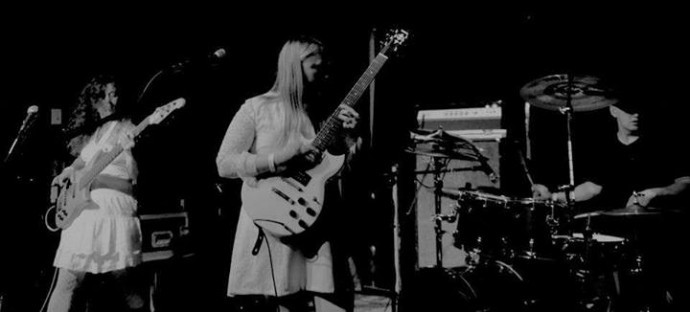
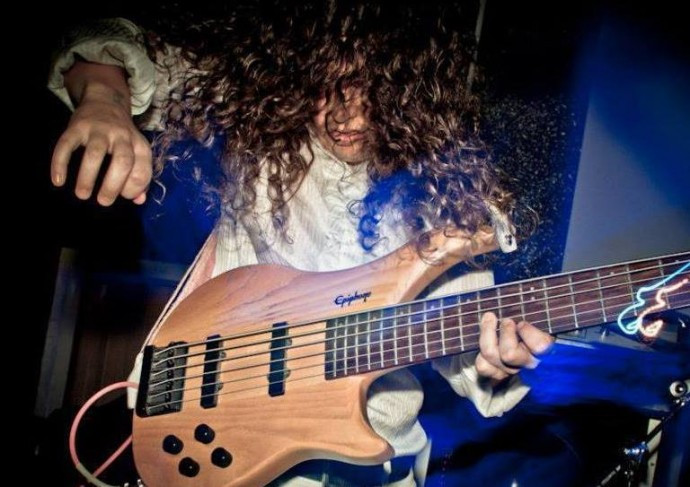
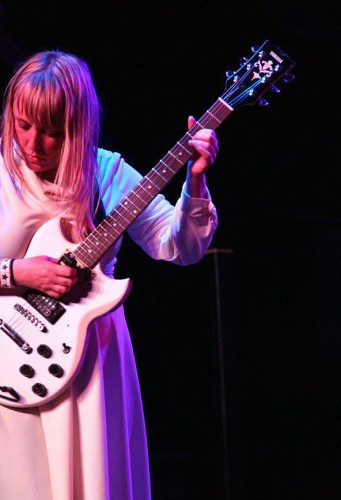
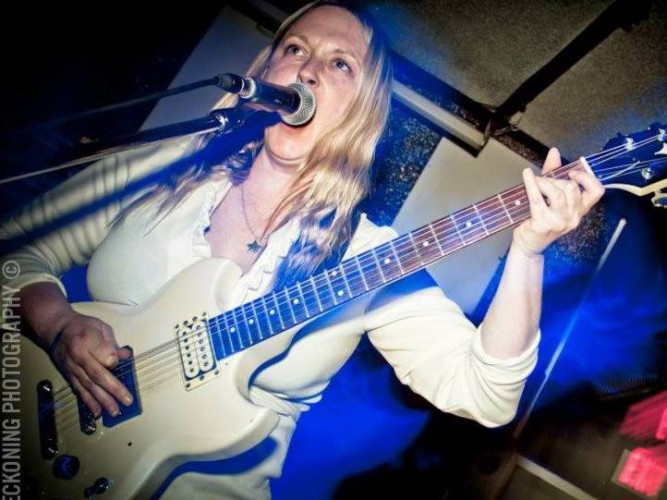
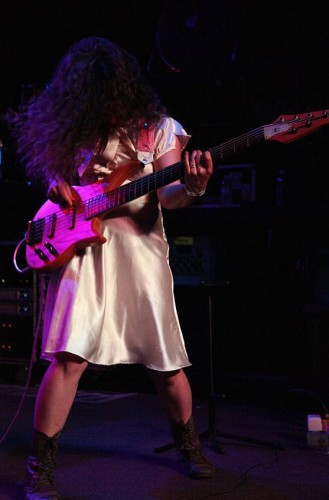
This was a stupidly good read. Thanks to all involved in this series.
this is a great interview and a damn cool band
“I personally have reclaimed the labels of false metal and poser.” I want this quote on a motivational poster for my music room.
These articles are so fantastic and just seem to be getting better as they go on. I get excited every time I see a new one on my RSS feed. Can they get a Womanowar tag?
That’s a good idea. I’ll add the tags now.